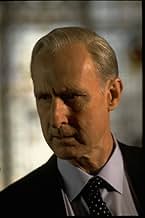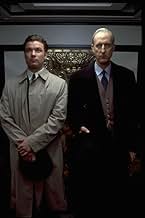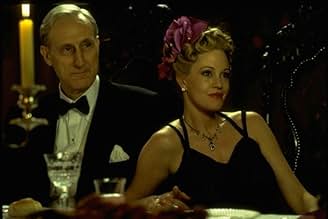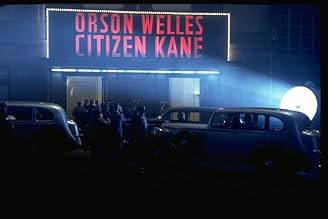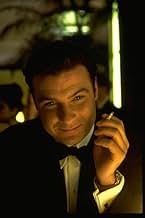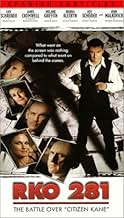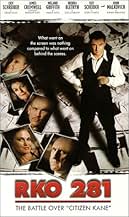CALIFICACIÓN DE IMDb
7.0/10
6.6 k
TU CALIFICACIÓN
Agrega una trama en tu idiomaOrson Welles produces his greatest film, El Ciudadano Kane (1941), despite the opposition of the film's de facto subject, William Randolph Hearst.Orson Welles produces his greatest film, El Ciudadano Kane (1941), despite the opposition of the film's de facto subject, William Randolph Hearst.Orson Welles produces his greatest film, El Ciudadano Kane (1941), despite the opposition of the film's de facto subject, William Randolph Hearst.
- Dirección
- Guionistas
- Elenco
- Ganó 3 premios Primetime Emmy
- 15 premios ganados y 28 nominaciones en total
- Dirección
- Guionistas
- Todo el elenco y el equipo
- Producción, taquilla y más en IMDbPro
Opiniones destacadas
10majikstl
The most remarkable thing about RKO 281 (subtitled "The Battle Over Citizen Kane") is that not only is it sympathetic to William Randolph Hearst and his paramour Marian Davies, but it also paints a less then flattering picture of film icon Orson Welles.
Every film buff worth his popcorn knows, or at least should know, the legend of CITIZEN KANE: Welles, the brilliant, but naive Boy Wonder, takes Hollywood by storm with his amazing and groundbreaking first picture, but falls victim to the tyranny of the cruel, thin-skinned billionaire Hearst, who tries to destroy the brilliant work of art. It is the David and Goliath saga of Tinseltown, with an art triumphs over commerce subtext. But the makers of this made-for-cable drama have opted to pull a switcheroo. Just as Welles bravely (or foolishly) challenged the legendary tycoon Hearst, RKO 281 rather courageously takes on the Welles legacy of the misunderstood genius. The results are gratifying, though the facts end up blurred all the more.
If there is, indeed, a villain in the whole CITIZEN KANE affair it would be screenwriter Herman J. Mankiewicz (played here by John Malkovich), who acted as Judas to W.R. and Marian, while serving as Iago to Welles's Othello. It was, according to historians, Mankiewicz who took a catalogue of firsthand observations and casual gossip gathered as a favored houseguest of the Hearst household and fashioned it into an unauthorized biography/screenplay. And it was Mankiewicz who goaded Welles to flirt with professional suicide by pursuing the project in the first place and by changing a film about a generic millionaire into a tale rife with details specific to Hearst.
But RKO 281 ventures a different theory, suggesting that Welles devised KANE as an elaborate weapon of revenge against Hearst for having been insulted at a dinner party. One suspects that Welles' crime was more one of clueless indifference than vengeance, but the latter does make the film more dramatically provocative. Whatever the case, Welles clearly bit off a much bigger bite than he anticipated when he deemed Hearst's personal life fair game.
Ironically, Welles' folly may not have been his audacity to attack Hearst, who surely faced greater critics, so much as the director's unintended assault on innocent bystander Davies. What RKO 281 highlights is that much of Hearst's ire against KANE was based to his desire to protect Davies from an unflattering portrayal and public scandal; not an unfounded fear, it would appear. In KANE, Hearst is presented in a mostly sympathetic light, and it is Davies who comes off the worst. Indeed, her alter ego, Susan Alexander is the film's least likable and empathetic character, an exceedingly dumb blonde who evolves into a shrieking, untalented alcoholic has-been diva. No other character in the film is as cruelly one-dimensional. Ironically, it may have been Mankiewicz's gallant, albeit foolish, attempt to protect his friend Davies, that caused all the problems. By making Susan so extremely different from the much beloved Davies, Mankiewicz may have thought people would see Alexander as a pure fiction. But such is the power and fame of KANE that then and future generations were destined to accept the legend over the reality and assume that Susan and Marian are one in the same. (Further irony: RKO 281 finds Marian played by a very Susan Alexander-like Melanie Griffith.)
Though the film notes the irony of the muckraker publisher suddenly finding himself the victim of the type of tabloid journalism that made him famous, RKO 281 is mostly sympathetic to Marian and W.R., who are seen as the ones under attack. As played by Liev Schreiber, Welles is the film's villain, who, filled with arrogance and ambition, sweeps into town with an itch to make a reputation for himself and a willingness to exploit others to do so. His petty, pseudo-socialist rantings about the evils of the very rich seem hollow in light of his ambitious desire to exploit others fame and reputation to make a name for himself. It is a different, unflattering side of Welles, who is usually seen as the perpetually embattled artist.
Yet, the plot takes another twist. Welles discovers that Hearst in particular and Hollywood in general weren't willing to just kowtow to his genius and like George Amberson Minafer in his THE MAGNIFICENT AMBERSONS, The Boy Wonder gets his comeuppance. Welles becomes just as much the victim of his arrogance as RKO, Hearst, Davies and Mankiewicz.
RKO 281 is a slick and entertaining effort, but it does miss a golden opportunity. The film would have been so much better had it invented its own "Rosebud" to search for and imitated CITIZEN KANE's ambitious visual style and confessional mock-documentary narrative drive. RKO 281 is a very conventional movie about a very unconventional film.
Every film buff worth his popcorn knows, or at least should know, the legend of CITIZEN KANE: Welles, the brilliant, but naive Boy Wonder, takes Hollywood by storm with his amazing and groundbreaking first picture, but falls victim to the tyranny of the cruel, thin-skinned billionaire Hearst, who tries to destroy the brilliant work of art. It is the David and Goliath saga of Tinseltown, with an art triumphs over commerce subtext. But the makers of this made-for-cable drama have opted to pull a switcheroo. Just as Welles bravely (or foolishly) challenged the legendary tycoon Hearst, RKO 281 rather courageously takes on the Welles legacy of the misunderstood genius. The results are gratifying, though the facts end up blurred all the more.
If there is, indeed, a villain in the whole CITIZEN KANE affair it would be screenwriter Herman J. Mankiewicz (played here by John Malkovich), who acted as Judas to W.R. and Marian, while serving as Iago to Welles's Othello. It was, according to historians, Mankiewicz who took a catalogue of firsthand observations and casual gossip gathered as a favored houseguest of the Hearst household and fashioned it into an unauthorized biography/screenplay. And it was Mankiewicz who goaded Welles to flirt with professional suicide by pursuing the project in the first place and by changing a film about a generic millionaire into a tale rife with details specific to Hearst.
But RKO 281 ventures a different theory, suggesting that Welles devised KANE as an elaborate weapon of revenge against Hearst for having been insulted at a dinner party. One suspects that Welles' crime was more one of clueless indifference than vengeance, but the latter does make the film more dramatically provocative. Whatever the case, Welles clearly bit off a much bigger bite than he anticipated when he deemed Hearst's personal life fair game.
Ironically, Welles' folly may not have been his audacity to attack Hearst, who surely faced greater critics, so much as the director's unintended assault on innocent bystander Davies. What RKO 281 highlights is that much of Hearst's ire against KANE was based to his desire to protect Davies from an unflattering portrayal and public scandal; not an unfounded fear, it would appear. In KANE, Hearst is presented in a mostly sympathetic light, and it is Davies who comes off the worst. Indeed, her alter ego, Susan Alexander is the film's least likable and empathetic character, an exceedingly dumb blonde who evolves into a shrieking, untalented alcoholic has-been diva. No other character in the film is as cruelly one-dimensional. Ironically, it may have been Mankiewicz's gallant, albeit foolish, attempt to protect his friend Davies, that caused all the problems. By making Susan so extremely different from the much beloved Davies, Mankiewicz may have thought people would see Alexander as a pure fiction. But such is the power and fame of KANE that then and future generations were destined to accept the legend over the reality and assume that Susan and Marian are one in the same. (Further irony: RKO 281 finds Marian played by a very Susan Alexander-like Melanie Griffith.)
Though the film notes the irony of the muckraker publisher suddenly finding himself the victim of the type of tabloid journalism that made him famous, RKO 281 is mostly sympathetic to Marian and W.R., who are seen as the ones under attack. As played by Liev Schreiber, Welles is the film's villain, who, filled with arrogance and ambition, sweeps into town with an itch to make a reputation for himself and a willingness to exploit others to do so. His petty, pseudo-socialist rantings about the evils of the very rich seem hollow in light of his ambitious desire to exploit others fame and reputation to make a name for himself. It is a different, unflattering side of Welles, who is usually seen as the perpetually embattled artist.
Yet, the plot takes another twist. Welles discovers that Hearst in particular and Hollywood in general weren't willing to just kowtow to his genius and like George Amberson Minafer in his THE MAGNIFICENT AMBERSONS, The Boy Wonder gets his comeuppance. Welles becomes just as much the victim of his arrogance as RKO, Hearst, Davies and Mankiewicz.
RKO 281 is a slick and entertaining effort, but it does miss a golden opportunity. The film would have been so much better had it invented its own "Rosebud" to search for and imitated CITIZEN KANE's ambitious visual style and confessional mock-documentary narrative drive. RKO 281 is a very conventional movie about a very unconventional film.
The key to enjoying this film is in being able to divorce yourself from the idea that this is an accurate representation of the making of Citizen Kane. RKO 281 as a stand-alone film is not bad, though the short running time left me feeling like I'd only seen the primary colors of what could've been a rich piece of fiction.
And it does feel more like fiction than truth.
Watching RKO 281 as a Welles enthusiast was a struggle. Welles himself was such a unique *presence*, a magician in more ways than one, and Liev Schreiber just doesn't evoke the god-like charisma and fury that were manifestations of Welles' particular genius. I would've preferred Vincent D'Onofrio (who pulled off an excellent Welles in Ed Wood after only two weeks of preparation) or even Oliver Platt. It is important to get the "character" of Welles RIGHT in a movie about his masterpiece. If RKO 281 failed egregiously on any level, it's this one.
Though this film is about the MAKING of Citizen Kane, it doesn't address why Citizen Kane had such an impact later in its life. We know that Welles had to fight very hard to save his picture against a variety of political agendas. However, a hard-won battle does not a classic film make...on its own. The only clues we get from RKO character Welles are his passionate and other-worldly exclamations along the lines of, "I just KNOW this is the MOMENT for this story!--Everything I AM is in this film!", etc. It's too mystical for me, and I think it does an injustice to the efforts of Welles and his collaborators to suggest that it was simply the luck (and maliciousness towards Hearst) of a spoiled boy wonder that made what is widely considered to be the best movie of all time.
Welles was in a unique position during that era. He had carte blanche in the movie studios--a status unprecedented before or since--and had the means to create his vision fully to his specifications. Getting the picture *released* was nothing short of a miracle, however, and I think it would've been interesting to dive into yet another layer of what Citizen Kane represents: Art for Art's sake. It's heartbreaking to note that Welles' subsequent film The Magnificent Ambersons was butchered beyond recognition by the studio--those who were fortunate enough to view Welles original (and now lost) cut thought that Ambersons was his true masterpiece, that Citizen Kane was merely a warm-up (!!!). Can you just imagine what this man could've accomplished if only...?
Which brings me to William Randolph Hearst. RKO 281 barely scratches the surface of how powerful Hearst was at the time. The residual effects of his attempt to stop Citizen Kane's release were felt by the film industry (and by Welles in particular) for many years after, and I would've liked to see the nature of this confrontation more clearly.
I've often said that Citizen Kane was Orson Welles' bane and salvation, for we see in hindsight that he sacrificed himself (and ultimately his future)
to earn a beautiful and tragic place in cinematic history. Overall, I wanted an edgier, darker, and more complex account of RKO 281. If I remove all pre-conceived notions and expectations, I find that this docudrama is interesting and fun to watch, but ultimately, I cannot help being drawn back to what made this 1999 film possible: the tumultuous triumph of a long-shot movie as envisioned by a temperamental, inexperienced genius. There are many shadowy folds to the real story of Citizen Kane, and RKO 281 feels like a bowl of plastic fruit in comparison.
And it does feel more like fiction than truth.
Watching RKO 281 as a Welles enthusiast was a struggle. Welles himself was such a unique *presence*, a magician in more ways than one, and Liev Schreiber just doesn't evoke the god-like charisma and fury that were manifestations of Welles' particular genius. I would've preferred Vincent D'Onofrio (who pulled off an excellent Welles in Ed Wood after only two weeks of preparation) or even Oliver Platt. It is important to get the "character" of Welles RIGHT in a movie about his masterpiece. If RKO 281 failed egregiously on any level, it's this one.
Though this film is about the MAKING of Citizen Kane, it doesn't address why Citizen Kane had such an impact later in its life. We know that Welles had to fight very hard to save his picture against a variety of political agendas. However, a hard-won battle does not a classic film make...on its own. The only clues we get from RKO character Welles are his passionate and other-worldly exclamations along the lines of, "I just KNOW this is the MOMENT for this story!--Everything I AM is in this film!", etc. It's too mystical for me, and I think it does an injustice to the efforts of Welles and his collaborators to suggest that it was simply the luck (and maliciousness towards Hearst) of a spoiled boy wonder that made what is widely considered to be the best movie of all time.
Welles was in a unique position during that era. He had carte blanche in the movie studios--a status unprecedented before or since--and had the means to create his vision fully to his specifications. Getting the picture *released* was nothing short of a miracle, however, and I think it would've been interesting to dive into yet another layer of what Citizen Kane represents: Art for Art's sake. It's heartbreaking to note that Welles' subsequent film The Magnificent Ambersons was butchered beyond recognition by the studio--those who were fortunate enough to view Welles original (and now lost) cut thought that Ambersons was his true masterpiece, that Citizen Kane was merely a warm-up (!!!). Can you just imagine what this man could've accomplished if only...?
Which brings me to William Randolph Hearst. RKO 281 barely scratches the surface of how powerful Hearst was at the time. The residual effects of his attempt to stop Citizen Kane's release were felt by the film industry (and by Welles in particular) for many years after, and I would've liked to see the nature of this confrontation more clearly.
I've often said that Citizen Kane was Orson Welles' bane and salvation, for we see in hindsight that he sacrificed himself (and ultimately his future)
to earn a beautiful and tragic place in cinematic history. Overall, I wanted an edgier, darker, and more complex account of RKO 281. If I remove all pre-conceived notions and expectations, I find that this docudrama is interesting and fun to watch, but ultimately, I cannot help being drawn back to what made this 1999 film possible: the tumultuous triumph of a long-shot movie as envisioned by a temperamental, inexperienced genius. There are many shadowy folds to the real story of Citizen Kane, and RKO 281 feels like a bowl of plastic fruit in comparison.
I saw it as an introduction in the universe of "Citizen Kane". Its birth, its battles, its price, secrets and victory premises. A powerful film and a great portrait of Orson Welles. And, sure, admirable performances, first - James Cromwell. A film about clashes and power and cynical fights. Maybe, about victories. Sure, it has many sins and, after its end, it is real easy to say than the idea deserves to be better used. But it represents more than a decent film and the work of Liev Schreiber is enough for remind the energy , force and ways of Orson Welles.
Very interesting movie about the battle to get Citizen Kane made has carved out a tricky niche for itself; the movie is going to be most interesting to fans of Welles and Kane, and those people are going to have such specific expectations about what the movie should be that they can't be satisfied.
I see a number of reviews here complaining that this movie doesn't show why Kane was a great movie, but that's not the movie that was being made. It is a short movie about a specific struggle, with brief glimpses into the filming, and unless it had been titled, "RKO 281: The Making of Citizen Kane," you can't fault it for not spending an hour on Welles innovations.
The film is entertaining, Schreiber is a good Welles and Malkovitch is also quite good. I note people also complain that the movie isn't all that accurate. I do wish the film had done a better job with Marian Davies, as one hears her described as fantastically charming and loved by Hollywood (it has been said that Welles' flaying of Davies did more to bring out the knives of the Hollywood press than his portrayal of Hearst). But come on, how can one complain about liberties taking with reality in a movie made about Welles, who loved taking liberties with reality?
I see a number of reviews here complaining that this movie doesn't show why Kane was a great movie, but that's not the movie that was being made. It is a short movie about a specific struggle, with brief glimpses into the filming, and unless it had been titled, "RKO 281: The Making of Citizen Kane," you can't fault it for not spending an hour on Welles innovations.
The film is entertaining, Schreiber is a good Welles and Malkovitch is also quite good. I note people also complain that the movie isn't all that accurate. I do wish the film had done a better job with Marian Davies, as one hears her described as fantastically charming and loved by Hollywood (it has been said that Welles' flaying of Davies did more to bring out the knives of the Hollywood press than his portrayal of Hearst). But come on, how can one complain about liberties taking with reality in a movie made about Welles, who loved taking liberties with reality?
Another reviewer already stated it very nicely. To enjoy this, you have to detach from thinking this is close to the truth. This is a dramatization and it is meant to tickle you, to tell a story. Sort of something Orson Welles liked to do. It is still based on certain things that happened while he tried making this major movie - for some even the best movie ever made. Whatever you think of Citizen Kane, you can't deny it's technical progress and thinking - how Welles used so many things to make a drama that touches on so many things.
Liev Schreiber is doing a fine job overall, though some might feel he could have been ... I guess crazier in his depiction. But we are supposed to root for our main character, so there goes that. Overall the acting is more than decent - especially for TV movies of that era. So if you are looking for light entertainment and are not up for the "real" documentary (which is Battle for Citizen Kane, which was an episode of a show), this will be more than fine enough a watch. If you are already aware of certain things it might help enjoy the movie - but as I initially said, you may also be annoyed by what the movie chooeses to show. Drama will be drama .. you need a bit of suspense sometimes
Liev Schreiber is doing a fine job overall, though some might feel he could have been ... I guess crazier in his depiction. But we are supposed to root for our main character, so there goes that. Overall the acting is more than decent - especially for TV movies of that era. So if you are looking for light entertainment and are not up for the "real" documentary (which is Battle for Citizen Kane, which was an episode of a show), this will be more than fine enough a watch. If you are already aware of certain things it might help enjoy the movie - but as I initially said, you may also be annoyed by what the movie chooeses to show. Drama will be drama .. you need a bit of suspense sometimes
¿Sabías que…?
- TriviaThe film shows RKO production chief George Schaefer announcing to Orson Welles and Herman J. Mankiewicz that he has lost his job on the very day of the opening of El Ciudadano Kane (1941) in May 1941. In fact, Schaefer did not get fired until late in the following year, and this was less because he had promoted the film career of Orson Welles than because almost all the films RKO had made during his tenure had been flops.
- ErroresIn 1940, Disney was not the major studio it was today. It had few major releases by that date, all animated and all of which were released through other distributors. The meeting of studio chiefs depicted in the movie probably did not take place- certainly not in the form shown- but even if it had, Walt Disney would probably not have been invited. (Samuel Goldwyn, also shown as present, had sold his share in MGM to Louis Mayer years earlier, but was still a major producer.)
- Citas
Orson Welles: I expected better of you, Mank.
Herman Mankiewicz: Me too, but I got used to it.
- Créditos curiososEpilogue: "Citizen Kane was released in 1941 to critical acclaim and box office indifference. William Randolph Hearst gradually withdrew from public life. Marion Davies continued to live with him as his mistress. Until his death in 1951, Hearst never permitted a single advertisement or review of Citizen Kane in any of his newspapers. Orson Welles struggled yet succeeded in making films for the rest of his life, including The Magnificent Ambersons, Touch of Evil and Chimes at Midnight. He died in 1985. Citizen Kane is widely considered the greatest American film ever made."
- ConexionesFeatured in The 57th Annual Golden Globe Awards (2000)
- Bandas sonorasI Can't Get Started
Written by Ira Gershwin and Vernon Duke
Performed by Bunny Berigan
Courtesy of The RCA Records Label of BMG Entertainment
Selecciones populares
Inicia sesión para calificar y agrega a la lista de videos para obtener recomendaciones personalizadas
Detalles
- Fecha de lanzamiento
- Países de origen
- Idioma
- También se conoce como
- RKO 281: The Battle Over Citizen Kane
- Locaciones de filmación
- St. Pancras Renaissance Hotel London, Euston Road, London, Greater London, Inglaterra, Reino Unido(staircase at Hearst Castle)
- Productoras
- Ver más créditos de la compañía en IMDbPro
Taquilla
- Presupuesto
- USD 12,000,000 (estimado)
- Tiempo de ejecución1 hora 26 minutos
- Color
- Mezcla de sonido
- Relación de aspecto
- 16:9
Contribuir a esta página
Sugiere una edición o agrega el contenido que falta

Principales brechas de datos
By what name was RKO 281 (1999) officially released in India in English?
Responda

